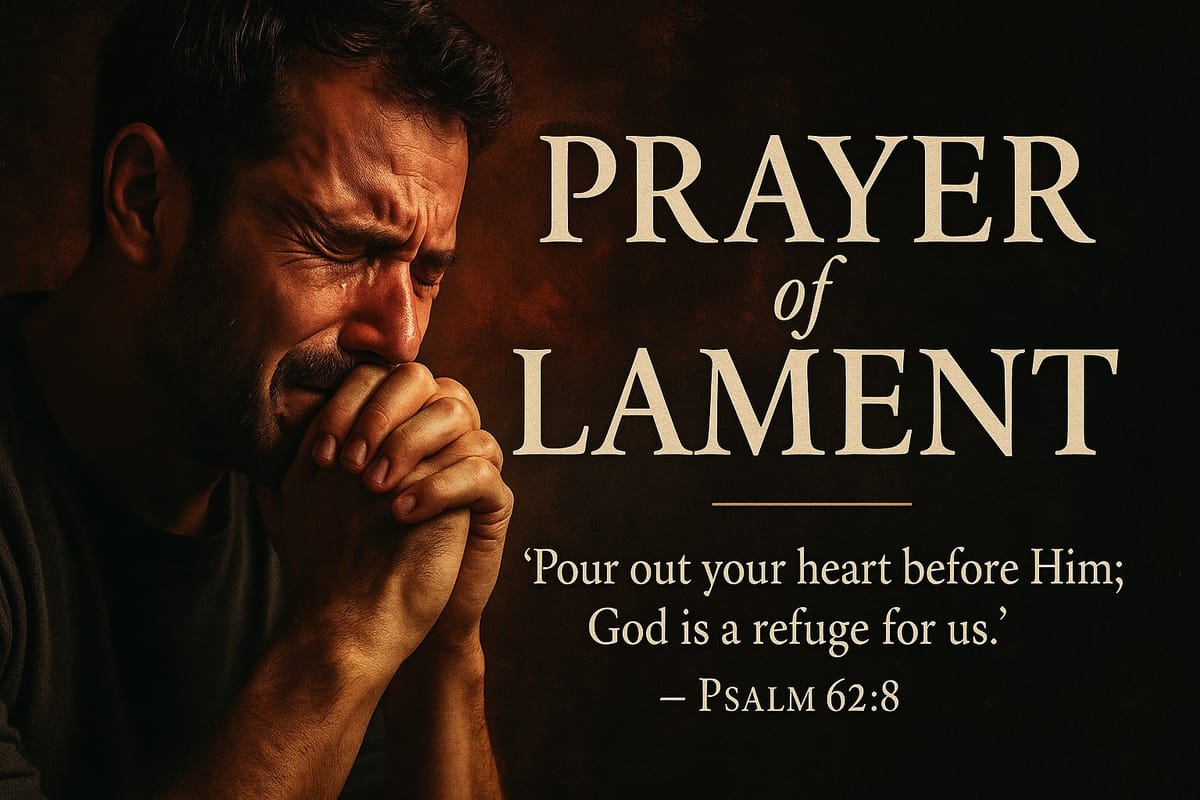Day 4: Honest Lament: Rediscovering the Sacred Power of Pouring Out Your Heart to God

“Pour out your heart before Him; God is a refuge for us.” — Psalm 62:8
When Prayer Becomes Too Polite
Let’s be honest.
Many of us were trained—explicitly or subtly—to perform in prayer.
To filter our words. To suppress our emotions. To talk to God like a king on a throne—but not like a Father who welcomes tears.
But the Bible doesn’t do that.
The Psalms—Jesus’ own prayerbook—are soaked in anguish, complaint, heartbreak, confusion, protest, and weeping.
God included them for a reason: because He wants the real you, not the sanitized version.
In fact, honest lament might be the most faithful prayer you ever pray.
What Is Lament?
Lament means to cry out in grief, sorrow, confusion, or even protest—honestly bringing your pain to God instead of hiding it.
It’s not complaining without hope.
It’s not despair without faith.
It’s the sacred act of telling God the truth when the world breaks your heart.
Restores a Biblical Practice
Lament is not a fringe expression; it is central to the biblical life of prayer.
The Bible is full of it:
- Nearly one‑third of the Psalms are laments—both personal and communal.
- Jeremiah, the “weeping prophet,” wrote an entire book called Lamentations.
- Job cried out in grief and confusion while still clinging to God.
Jesus Himself lamented in Gethsemane and on the cross:
“My soul is very sorrowful, even to death.” — Matthew 26:38
“My God, my God, why have You forsaken me?” — Matthew 27:46
These aren’t minor moments. They are the spiritual backbone of people walking through real suffering with a real God.
We’ve often reduced prayer to praise, petitions, or silence. But the Scriptures invite us to bring our grief too.
Lament is a sacred act of faith that says:
“I still believe You’re listening—even when I don’t understand.”
Restoring lament is not being dramatic; it’s returning to the ancient path—a more honest, more human, and more biblical way of walking with God.
The Problem: Spiritual Suppression
Somewhere along the way, we believed the lie that real faith means holding it together—
- That tears show weakness.
- That anger must be stuffed.
- That doubt is a sin.
So we “keep the faith”—but lose the voice.
And slowly, our prayer life grows dull.
Not because God is boring,
but because we’ve stopped bringing Him the truth.
The Invitation: Pray What’s Real
God doesn’t need a performance—He wants your presence.
If you’re angry—say it.
If you’re broken—sob it.
If you’re tired of waiting—speak it aloud.
If you don’t understand—ask.
Lament is worship in pain.
It’s what David did. It’s what Job did. It’s what Jesus did in Gethsemane and again on the cross:
“My God, my God, why have You forsaken me?” (Matthew 27:46)
Honest lament doesn’t betray faith—it proves it.
It’s refusing to walk away. It’s daring to believe that God is big enough to hold your sorrow.
A Voice from Church History (and Today)
St. Gregory of Nyssa, a 4th-century church father, once wrote:
“Tears are the food of the soul in times of drought.”
For centuries, the Church embraced lament as a sacred practice.
In cathedrals, monks in caves, and communities in cloisters, tears were not seen as weakness but as a profound act of faith—
a gift of the Spirit that softened hearts, cleansed souls, and deepened communion with God.
This tradition reminds us that lament is not a modern invention but a timeless expression of trust in a God who hears.
Today, author and speaker Ann Voskamp echoes this truth:
“Lament is the bridge between pain and praise, the honest cry that keeps us from pretending everything is fine when it’s not.
It’s the prayer that says, ‘I’m hurt, but I’m still here, still Yours.’”
We’ve lost the tears.
But it’s time to get them back.
Today’s Practice: Honest Lament
- Find a quiet place. Get real. Get raw. No filters.
- Write or speak your lament to God. Tell Him everything. Don’t hold back—your grief, confusion, anger, disappointments. He already knows, but He wants to hear it from you.
End with trust. Like the psalmists do:
“But I have trusted in Your steadfast love…” (Psalm 13:5)
Lament doesn’t mean despair. It ends in trust—but only after truth is poured out.
Read Psalm 13 aloud—slowly, honestly. Let David’s words become your own:
“How long, O Lord? Will You forget me forever?” (Psalm 13:1)




